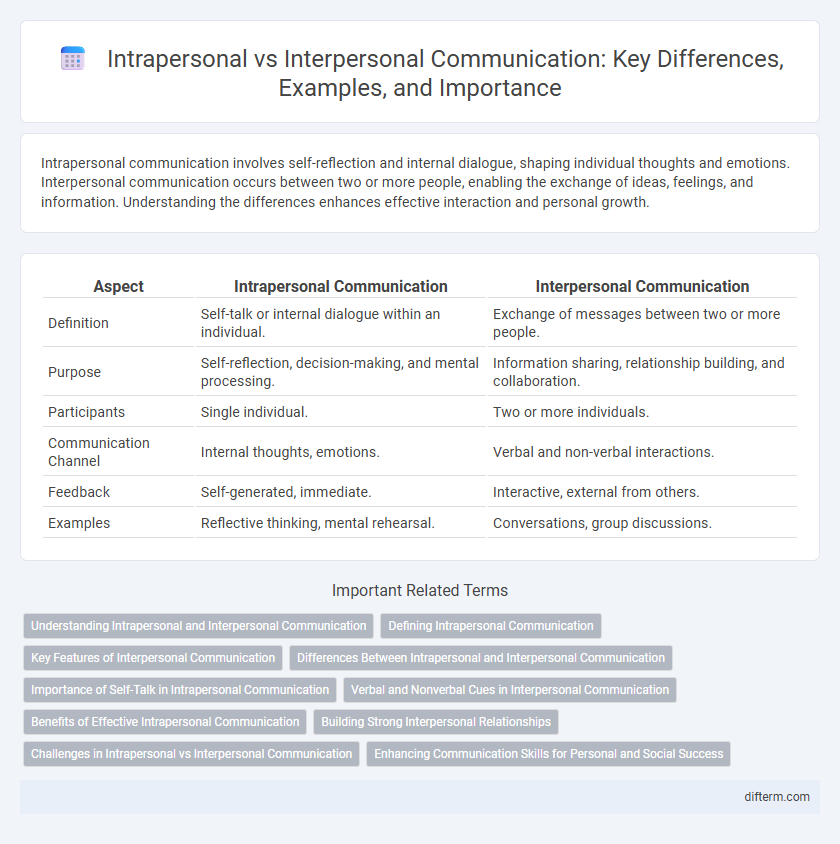Intrapersonal communication involves self-reflection and internal dialogue, shaping individual thoughts and emotions. Interpersonal communication occurs between two or more people, enabling the exchange of ideas, feelings, and information. Understanding the differences enhances effective interaction and personal growth.
Table of Comparison
| Aspect | Intrapersonal Communication | Interpersonal Communication |
|---|---|---|
| Definition | Self-talk or internal dialogue within an individual. | Exchange of messages between two or more people. |
| Purpose | Self-reflection, decision-making, and mental processing. | Information sharing, relationship building, and collaboration. |
| Participants | Single individual. | Two or more individuals. |
| Communication Channel | Internal thoughts, emotions. | Verbal and non-verbal interactions. |
| Feedback | Self-generated, immediate. | Interactive, external from others. |
| Examples | Reflective thinking, mental rehearsal. | Conversations, group discussions. |
Understanding Intrapersonal and Interpersonal Communication
Intrapersonal communication involves self-reflection and internal dialogue, shaping personal thoughts, emotions, and decision-making processes. Interpersonal communication involves the exchange of information between two or more people, emphasizing verbal and nonverbal messages to build relationships and convey meaning effectively. Mastering both types enhances emotional intelligence and improves overall communication skills.
Defining Intrapersonal Communication
Intrapersonal communication refers to the internal dialogue that occurs within an individual, encompassing self-reflection, thought processes, and emotional regulation. It plays a crucial role in shaping self-awareness, decision-making, and personal motivation. Understanding intrapersonal communication enhances an individual's ability to manage emotions and improve overall mental clarity.
Key Features of Interpersonal Communication
Interpersonal communication involves the exchange of messages between two or more people, emphasizing active listening, verbal and nonverbal cues, and emotional intelligence. Key features include face-to-face interaction, immediate feedback, and the ability to build relationships through empathy and mutual understanding. Unlike intrapersonal communication, which occurs within oneself, interpersonal communication facilitates collaboration, conflict resolution, and social connection.
Differences Between Intrapersonal and Interpersonal Communication
Intrapersonal communication involves self-talk, internal thought processes, and reflection, whereas interpersonal communication requires interaction between two or more individuals exchanging messages verbally or non-verbally. Intrapersonal communication is primarily internal and private, focusing on self-awareness and decision-making, while interpersonal communication is external and social, emphasizing relationship building and feedback. The key difference lies in the number of participants and the nature of the message exchange, with intrapersonal being solo and reflective, and interpersonal being interactive and relational.
Importance of Self-Talk in Intrapersonal Communication
Self-talk plays a critical role in intrapersonal communication by shaping thoughts, emotions, and behaviors, ultimately impacting decision-making and self-awareness. Positive self-talk enhances confidence, reduces stress, and fosters problem-solving abilities, which are essential for personal growth. Understanding the dynamics of internal dialogue helps individuals regulate their mental state and improve overall communication effectiveness.
Verbal and Nonverbal Cues in Interpersonal Communication
Interpersonal communication relies heavily on both verbal cues, such as tone, pitch, and word choice, and nonverbal cues, including body language, facial expressions, and eye contact, to convey meaning effectively. Understanding the interplay between these verbal and nonverbal signals enhances message clarity and fosters stronger connections between individuals. Mastering these cues improves empathetic listening and response, crucial for effective interpersonal interactions.
Benefits of Effective Intrapersonal Communication
Effective intrapersonal communication enhances self-awareness, enabling individuals to regulate emotions and make informed decisions. It fosters clarity in thought processes, which improves problem-solving and goal-setting abilities. Developing strong intrapersonal skills ultimately strengthens overall communication competence and personal growth.
Building Strong Interpersonal Relationships
Building strong interpersonal relationships requires effective communication skills that foster trust, empathy, and mutual understanding. Developing self-awareness through intrapersonal communication enhances emotional regulation and clarity, which directly improves interactions with others. Consistent practice of active listening and open dialogue strengthens connections, promoting collaboration and deeper social bonds.
Challenges in Intrapersonal vs Interpersonal Communication
Intrapersonal communication challenges often involve self-perception issues, internal biases, and difficulty in regulating emotions, which can distort self-reflection and decision-making. Interpersonal communication challenges include managing misunderstandings, navigating cultural differences, and balancing power dynamics between individuals. Both communication types require distinct skills to overcome barriers and achieve effective message exchange.
Enhancing Communication Skills for Personal and Social Success
Intrapersonal communication sharpens self-awareness and emotional intelligence, foundational for effective decision-making and self-regulation. Interpersonal communication builds relational skills, enabling active listening, empathy, and conflict resolution essential for social success. Mastering both communication forms enhances overall personal growth and facilitates meaningful connections in diverse social environments.
intrapersonal vs interpersonal Infographic

 difterm.com
difterm.com